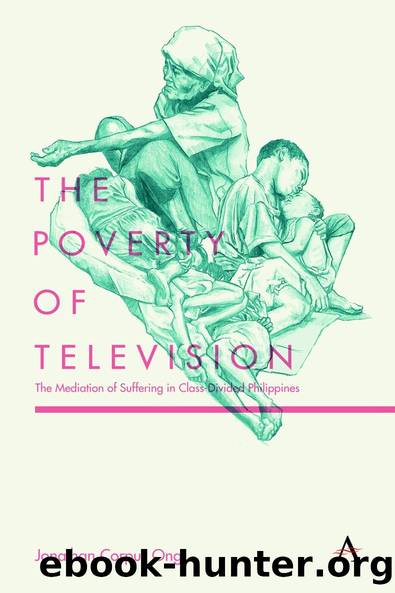The Poverty of Television by Jonathan Corpus Ong

Author:Jonathan Corpus Ong [Ong, Jonathan Corpus]
Language: eng
Format: epub
Tags: Social Science, Media Studies, Anthropology, Cultural & Social, Philosophy, Ethics & Moral Philosophy
ISBN: 9781783084449
Google: 38tRDwAAQBAJ
Publisher: Anthem Press
Published: 2015-05-15T04:07:03+00:00
Agency and Strategic Suffering
In this section, I argue that judgments of the deserving sufferer are underpinned by understandings of agency and victimhood. As previously mentioned, media ethics debates in textual ethics variably argue whether sufferers on television should be depicted as having agency or less agency, with the assumption that representational strategies influence audience engagement towards televised suffering. Drawing from my interviews though, this section argues that agency is not solely a property of the television text, but is dependent on audiencesâ interpretations. Audiences, from different classes, differently perceive the presence or absence of agency in Wowowee âsufferersâ.
Let us begin with upper-class audiences. From the earlier discussion on âHep Hep Hoorayâ, we learned that upper-class respondents are not concerned with the success or failure of one contestant over another. I suggested that this disinterest comes from an understanding of the showâs contestants as homogeneously poor and therefore equally deserving, rather than variably poor and variably deserving, as lower- and middle-class respondents understand. Certainly, they draw from limited resources in recognizing and understanding differences among sufferers, as they inhabit zones of safety and âfly overâ zones of danger, in the desire to construct borders by which class differences are blocked or at least managed. In chapter three, we saw that boundary construction in symbolic spaces of the media follow geographical boundaries between rich and poor in urban life.
Upper-class respondents make frequent references to Wowoweeâs exploitation of contestants and manipulation of game show mechanics that run contrary to their genre expectations.
Perhaps this is most evident in their complaint about Wowoweeâs sound production. A common complaint I heard among my upper-class respondents is how the show is âso noisyâ. Some viewers find Willie too talkative: âHe lectures contestants how to live their lives. Umm, does Ryan Seacrest do that?â Some dislike the sound of his laughter: âWhen he makes fun of the contestants, his laughter is so irritating. Itâs demeaning.â This surveillance of excessive emotional displays is by no means local to the Philippine context; Bourdieu (1986) and Skeggs (1997; 2004) have made similar observations in the French and British contexts.
Further, upper-class respondents find the sound crew of Wowowee intrusive, insofar as their sound effects and background music call attention to themselves. In one group interview, the sound production became a heated point of discussion.
Download
This site does not store any files on its server. We only index and link to content provided by other sites. Please contact the content providers to delete copyright contents if any and email us, we'll remove relevant links or contents immediately.
| Direction & Production | Genres |
| Guides & Reviews | History & Criticism |
| Reference | Screenwriting |
| Shows |
Robin by Dave Itzkoff(2436)
Head of Drama by Sydney Newman(2296)
I'm Judging You by Luvvie Ajayi(2202)
The Paranormal 13 (13 free books featuring witches, vampires, werewolves, mermaids, psychics, Loki, time travel and more!) by unknow(2084)
Ten by Gretchen McNeil(1884)
Single State of Mind by Andi Dorfman(1809)
#MurderTrending by Gretchen McNeil(1656)
Key to the Sacred Pattern: The Untold Story of Rennes-le-Chateau by Henry Lincoln(1624)
Merv by Merv Griffin(1610)
Most Talkative by Andy Cohen(1588)
This Is Just My Face by Gabourey Sidibe(1467)
Notes from the Upside Down by Guy Adams(1467)
The Hunger Games: Official Illustrated Movie Companion by Egan Kate(1426)
Springfield Confidential by Mike Reiss(1412)
Binging with Babish by Andrew Rea(1409)
Jamie Oliver by Stafford Hildred(1387)
The TV Writer's Workbook: A Creative Approach To Television Scripts by Ellen Sandler(1347)
Clarkson--Look Who's Back by Gwen Russell(1342)
Blue Planet II by James Honeyborne & Mark Brownlow(1282)
